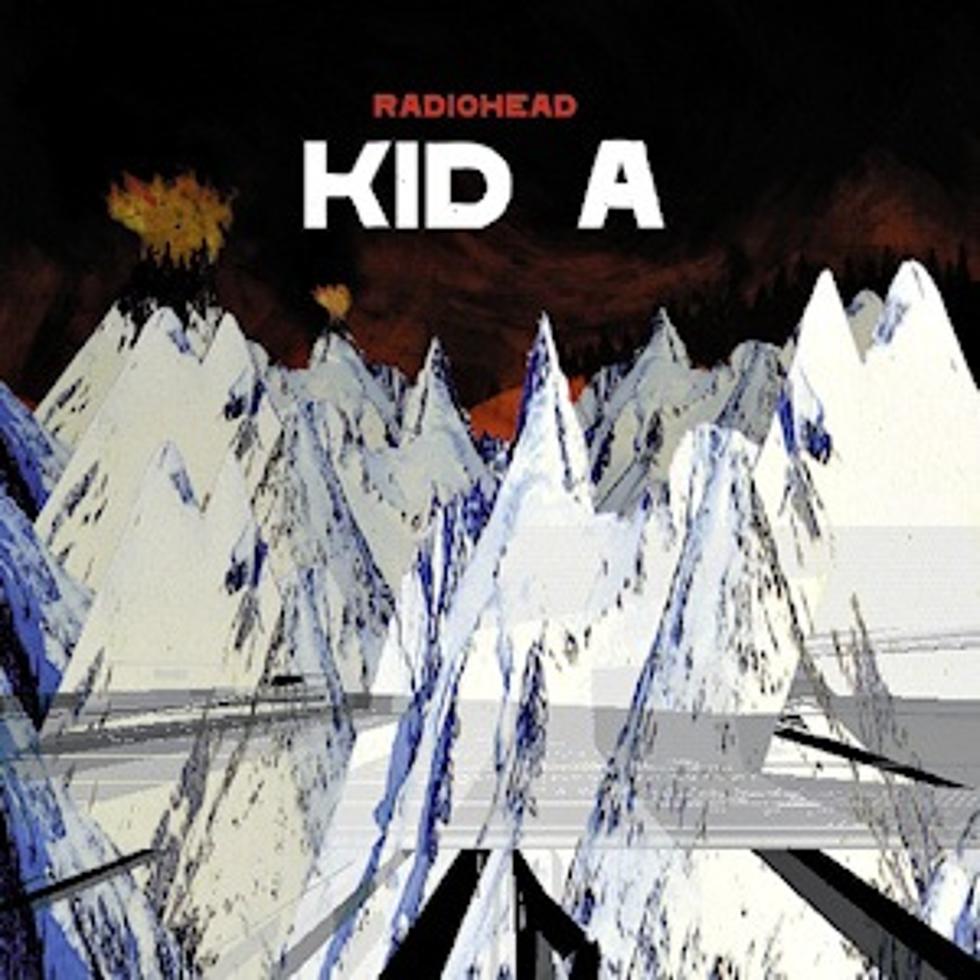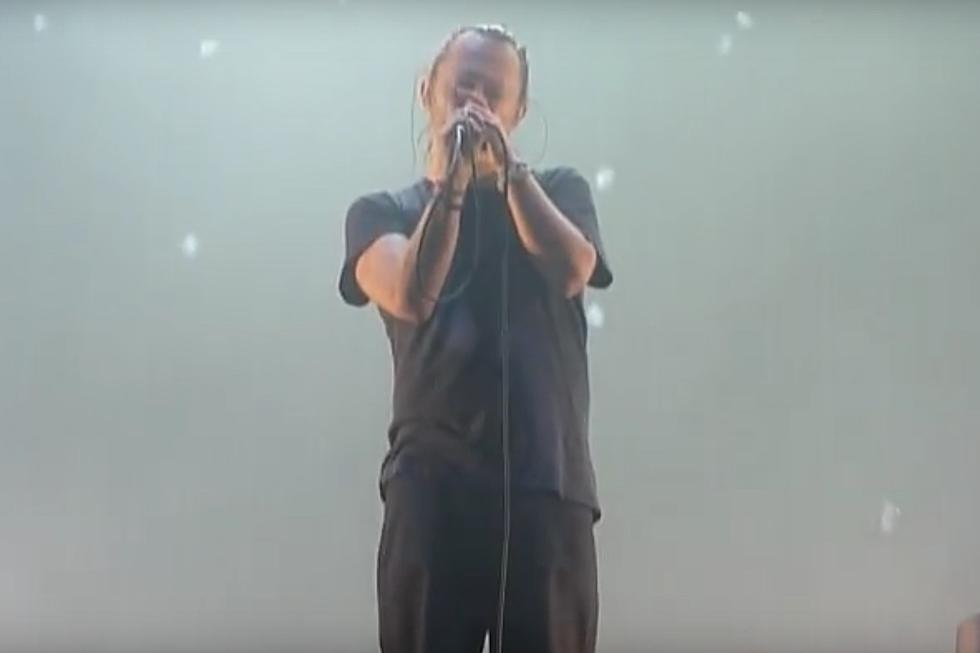
15 Years Ago: Radiohead Redefine the Parameters of Music With the Groundbreaking ‘Kid A’
"The problem we have found is that we are essentially in limbo," wrote guitarist Ed O'Brien in an August 4, 1999 diary entry from the making of Radiohead's Kid A. "For the first time, we have nothing to get ready for, except 'an album.' But we've been working on that since January and nothing substantial has come of it except maybe a few harsh lessons in how not to do things. It's like 'how do we start this?' When we made our last three albums, there were time restrictions. We no longer have these. Are we going down [the same path as] the Stone Roses? [...] We need a plan and something to aim for..."
At the end of the same entry, O'Brien concedes that he and his bandmates had in fact "recorded some good stuff" by this point – in truth, there were already a handful of songs in the bag that they'd later end up keeping. But seven months into their attempt to follow-up on their breakout album, 1997's OK Computer, Radiohead found themselves adrift on open water with no clear sense of how to proceed. As O'Brien's comments suggest, lacking direction, having low morale and a lack of time constraints all conspired to make for an extremely difficult process – so difficult that the band came dangerously close to breaking up in the midst of their creative paralysis.
Of course, that's not how things turned out. And once the creative rapport between the band members began to click, Radiohead hit on a collective groove, ultimately churning out approximately 60 completed songs, 21 of which they chose to release as two separate companion albums: Kid A in 2000 and Amnesiac eight months later in 2001. But O'Brien's account makes it painfully clear: as the weeks rolled by and turned into months, Radiohead spent the bulk of 1999 soldiering through a mounting sense of futility and dread as neither the band nor producer Nigel Godrich could envision a coherent album taking shape out of a pile of ideas that just kept growing.
Imagine for a moment that you're in a three-guitar band that's achieved international stardom on the strength of catchy, albeit smart and inventive guitar rock. Then imagine that someone (say, a producer or manager) instructs you to marginalize the role of the guitars, drums, bass and vocals (i.e: every single instrument the band plays) all while struggling with internal pressure to match the ingenuity of your last album – an album that happened to garner gushing acclaim and cries from the music press that your band was poised to quote-unquote save rock and roll. Under these circumstances, you and your bandmates might have good reason to cry out with a collective "WTF"?
Even when Radiohead gutted their sound and groped in the dark for fresh deconstructivist approaches, the spirit of the band’s creativity prevailed.
In Radiohead's case, though, it wasn't an external source issuing these orders – Godrich has admitted he was initially baffled as well – but frontman-bandleader Thom Yorke, whose disgust in the wake of OK Computer's success left him suffering from a nasty case of writer's block and alienation (the first stirrings of which can be seen in the OK Computer-era documentary Meeting People Is Easy). Much to the concern of Godrich and his bandmates, Yorke insisted that the band relinquish guitars as the primary foundation of their songs, supplanting the core of the music with an abstract palette of synthetic sounds rooted in the progressive electronica of acts like Aphex Twin and Autechre. Eventually, everyone got on board with Yorke, and each member came to relish his role generating sounds and tweaking sounds generated by the other members.
Indeed, when Kid A begins with the haunting "Everything in its Right Place," it's immediately apparent that Radiohead had atomized all traces of their pop instincts into digital dust. Tellingly, in the album's first appearance of intelligible vocals, Yorke sings "I'm not here / this isn't happening" on "How to Disappear Completely." Indeed, for most of the album, our conventionally defined notions of "song" and "band" dissolve into a gauzy meshwork of gleaming computerized surfaces that threaten to swallow the music's organic elements (e.g: live drums, the occasional acoustic guitar and string arrangements courtesy of the Orchestra of St. John's). But as opaque as Kid A sounds – by design, the music instills a sense of spacial disorientation that's vaguely unsettling – the songs also radiate with a warmth that belies their sonic construction.
When the crashing buildup of "Optimistic," for example, dies down to a gentle murmur that gives way to the ethereal "In Limbo" – where echoing keyboards, delicate guitar, splashing cymbals and Yorke's voice fall like a soft acid rain from a gray, hopelessly polluted sky – Radiohead are clearly aiming for a breathtaking moment. Yes, Kid A observes humanity through the eyes of Yorke's oft-voiced concerns about the environment, industrial abuse, rampant modernization and enslavement to technology – a humanity in danger of choking its own chances of survival at the cusp of the new millennium – but the songs nevertheless retain the essence of that humanity. And in pure musical terms, it's obvious that Radiohead were reaching for majestic heights with the darkened shadings they chose to build the music out of. That they did so in the relative absence of hooks says a lot about their ability to craft memorable songs regardless of the ingredients.
As Kid A shows, even when Radiohead gutted their sound and groped in the dark for fresh deconstructivist approaches, the spirit of the band's creativity prevailed in preventing the final results from succumbing to the formless mess they could have been. Looking back, we can only speculate on the album's greater impact. Does the experimental flavor of Wilco's similarly groundbreaking Yankee Hotel Foxtrot owe any debt to the path that Radiohead paved with Kid A? Or do both albums exemplify broader undercurrents at play in the culture at large in the late '90s and early 2000s?
Either way, it's safe to wager that Kid A inspired scores of artists to explore similar terrain in their own work. Just two years ago, Detroit rapper Danny Brown wore his Kid A influence on his sleeve while making his 2013 album Old. Brown's testimony is just one of many that indicate how much of a chord Kid A has struck with musicians of all stripes, and thus how far-reaching a shadow the album continues to cast over the musical landscape.
Worst to First – Every Radiohead Album Ranked
More From Diffuser.fm









